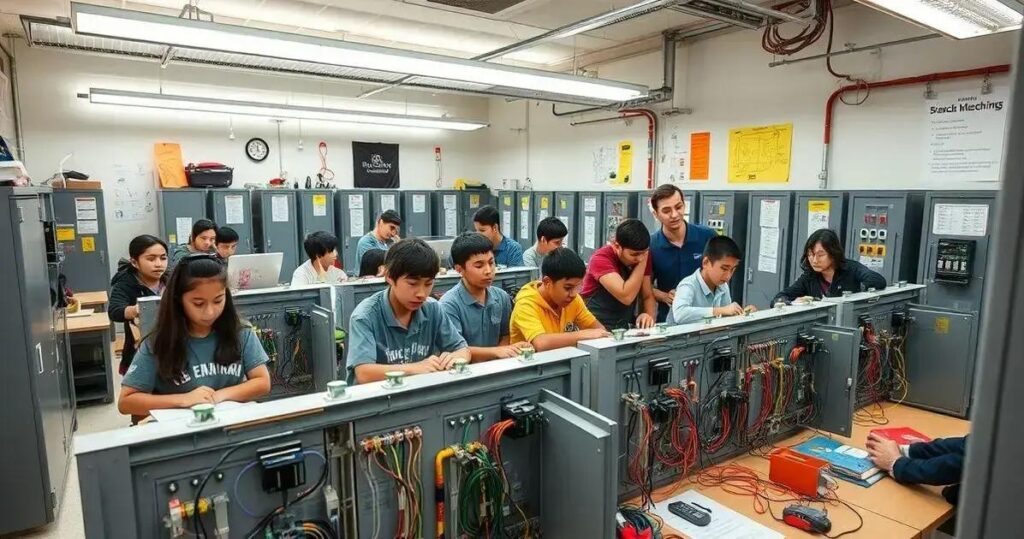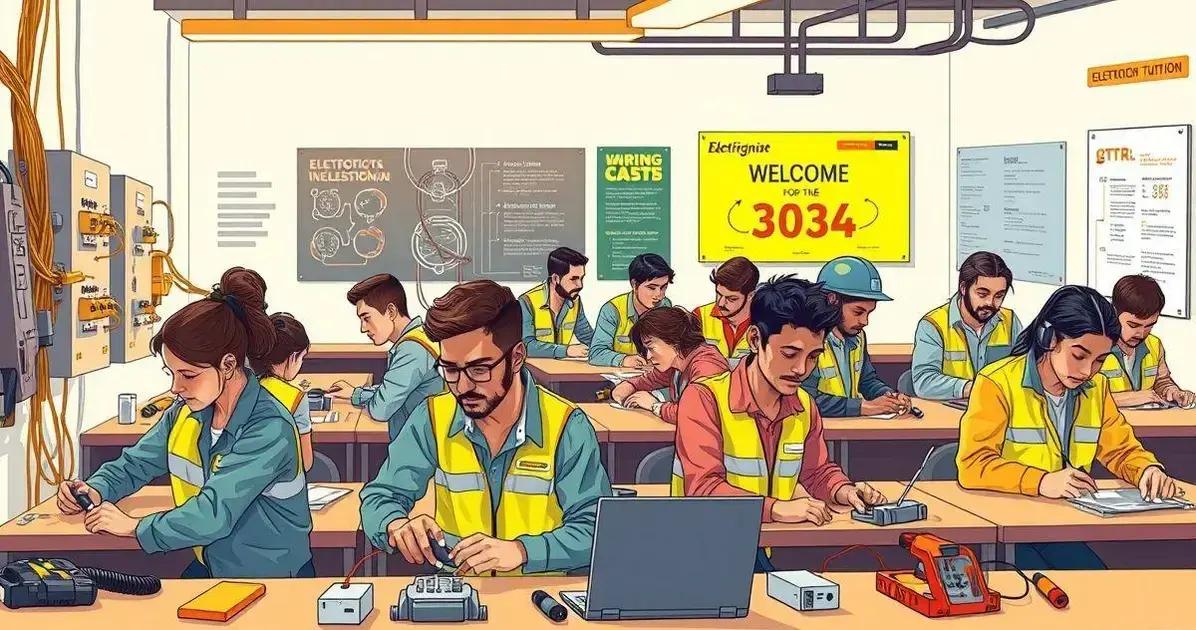Electrician Courses: Discover Top Programs & Empower Your Career Today!

Choosing to enroll in electrician courses can be the key to unlocking a lucrative and rewarding career. With the demand for skilled electricians on the rise, these courses provide comprehensive training that not only sharpens your technical skills but also boosts your employability. Explore the various electrician programs available, from online options to hands-on training, and find the perfect fit for your schedule and learning style. Whether you’re starting from scratch or enhancing existing skills, our guide covers everything from course details to long-term career benefits.
Why Choose Electrician Courses for Your Career
Electrician courses offer an excellent pathway to a stable and well-paying career. These courses equip you with the essential skills required for the electrical industry, a field continuously growing in demand. With energy needs increasing, skilled electricians are needed now more than ever.
By enrolling in an electrician course, you gain comprehensive training that prepares you for various tasks, from residential wiring to industrial systems. Beyond technical know-how, these courses teach safety procedures, crucial for any aspiring electrician. You’ll learn how to prevent electrical hazards and ensure that all work complies with industry standards.
Another great advantage of electrician courses is the
hands-on experience
they offer. Many programs include practical training sessions, allowing you to practice with real-world equipment under professional guidance. This experience is invaluable as it builds confidence and prepares you for the real demands of the job.
In today’s job market, employers value candidates with certified training. Completing an electrician course not only enhances your resume but also boosts your employability. Many programs assist with job placement, connecting graduates with potential employers.
Electrician courses also offer specialization opportunities. Whether your interest lies in renewable energies, automation, or traditional electrical work, there are courses tailored to every niche. This flexibility allows you to pursue a specific career path aligned with your long-term goals.
Ultimately, pursuing an electrician education is an investment in your future, offering a fulfilling career rich with opportunities. Whether you’re looking to upskill or start anew, the pathway provided by these courses is both promising and exciting.
Top Electrician Courses to Consider in 2023

In 2023, aspiring electricians have a wealth of options when choosing the top electrician courses. These programs range from introductory courses aimed at beginners to specialized training for those looking to advance their careers.
First on the list is the National Joint Apprenticeship and Training Committee (NJATC) program. This course offers a comprehensive curriculum that combines classroom learning with on-the-job training. It’s an excellent choice for those who appreciate a structured, industry-recognized path.
The Independent Electrical Contractors (IEC) Apprenticeship is another top contender. Known for its focus on practical skills and competitive earning potential, this program is ideal for hands-on learners. It covers residential, commercial, and industrial electrical systems, ensuring graduates are well-prepared for varied job opportunities.
For those seeking flexibility, the Penn Foster Electrician Program offers online courses that cater to busy schedules. This course is perfect for students who need to balance studies with professional or personal commitments, providing a self-paced learning experience with a supportive online community.
Additionally, the Electrical Training Alliance provides numerous programs across the country. Their courses are acclaimed for their rigorous training and state-of-the-art facilities, making them suitable for individuals aiming to master cutting-edge technologies.
Lastly, don’t overlook community college programs like the one offered by the City College of New York. These courses boast experienced instructors and affordable tuition, making quality education accessible to more students.
What to Expect: A Day in an Electrician Course
In an electrician course, each day offers a blend of theory and practical skills, crucial for future success. Expect to start your day with some classroom learning, where instructors cover vital topics like electrical theory, circuit analysis, and safety regulations.
As you delve into the coursework, you’ll likely encounter hands-on sessions. These practical classes are conducted in well-equipped labs, designed to mimic real-world settings. Here, you’ll test circuits, troubleshoot issues, and gain a thorough understanding of wiring systems.
Group projects and collaborative exercises are also integral parts of the program. Working with peers enhances your problem-solving skills, as you tackle complex electrical setups and learn to coordinate effectively with a team.
In the afternoon, courses often shift back to theoretical components, such as reading blueprints or understanding electrical codes. This portion of the day might include quizzes or assessments to ensure comprehension of key concepts.
Throughout the day, instructors provide personalized attention, addressing questions and offering feedback on practical tasks. This guidance helps solidify your knowledge and boosts your confidence in handling electrical systems.
Finally, expect to spend some time on independent study, researching new technologies or preparing for upcoming projects. This aspect of the course fosters critical thinking and encourages you to stay current in the evolving electrical industry.
Certification and Skills Gained from Electrician Training

Completing an electrician training program not only enhances your technical skills but also leads to valuable certifications that boost your career prospects. One major credential is the Journeyman Electrician License, which certifies your ability to perform electrical tasks independently.
Training courses prepare you for the necessary exams to obtain these licenses. They cover key knowledge areas such as electrical codes and safety regulations, ensuring you’re well-equipped to handle various electrical systems safely and efficiently.
Alongside certification, practical skills gained from these courses are indispensable. You’ll master the art of circuit analysis, effectively troubleshoot electrical problems, and perform installations with precision.
Training programs emphasize the importance of safety, teaching you to implement essential safety protocols and use tools correctly. This expertise reduces the risk of accidents and ensures compliance with industry standards.
Another crucial skill is understanding blueprints and schematics. These skills allow you to interpret and execute electrical plans accurately, a necessity for any professional electrician.
Lastly, courses often include lessons on emerging technologies, such as renewable energy systems and smart home technology. This modern knowledge enables you to stay competitive and adapt to the rapidly evolving electrical industry.
Online vs. In-Person Electrician Courses: Pros and Cons
Choosing between online and in-person electrician courses involves weighing their unique advantages and limitations. Online courses offer the flexibility to learn at your own pace, making them ideal for those balancing work or family commitments. These courses provide access to a wide range of resources, including tutorials and forums, which can enhance your self-directed learning.
However, online courses may lack the hands-on experience crucial for mastering practical skills. While virtual simulations are beneficial, they can’t fully replace real-world practice. Additionally, online learners might miss out on immediate feedback and support from instructors, which can slow progress for some students.
In-person courses, on the other hand, excel in providing practical training. With direct access to tools and equipment, you gain valuable experience under the guidance of experienced instructors. This setup enables you to ask questions and get live feedback, facilitating a deeper understanding of complex concepts.
One downside of in-person training is the lack of schedule flexibility. These courses often require a set attendance, which might not suit everyone. Additionally, they can incur additional costs such as commuting and materials, making them a more significant financial commitment.
Both types of courses offer networking opportunities. Online classes connect you with a global community, while in-person setups allow you to meet peers and professionals locally. Choosing the right format depends on your learning style, schedule, and career goals.
Electrician Courses: Cost, Duration, and Career Benefits

Deciding to enroll in electrician courses involves understanding the costs, time commitments, and career benefits. The cost of these courses can vary widely depending on the type of program and institution. On average, tuition can range from $1,000 to $15,000. This range includes both online and in-person formats, with many programs offering payment plans or financial aid to ease the burden.
The duration of electrician courses typically spans several months to a year. Apprenticeships, often integral to hands-on learning, may last longer, generally around four years. This combination of classroom education and practical experience ensures a comprehensive understanding of the field.
Investing in these courses yields significant career benefits. Electricians are in high demand, with job growth projected to continue rising. This demand translates into competitive salaries and job stability, which are appealing advantages for many.
Professionals with electrician training can explore various opportunities, such as working in construction, maintenance, or renewable energies. Specialized skills in areas like solar power systems or smart home technology further enhance employability and potential earnings.
Aside from technical skills, these courses bolster career attributes such as problem-solving and critical thinking. Such skills are highly valued across industries and can open doors to advanced roles or entrepreneurial ventures.
The Power of Electrician Courses in Career Building
Choosing to pursue electrician courses is a strategic investment in your professional future. These courses offer comprehensive training, preparing you for a thriving career in a high-demand industry.
Whether you opt for a flexible online program or immersive in-person training, you will gain essential skills and credentials that enhance your employability and open the door to diverse job opportunities.
With the growing need for skilled electricians, these courses not only ensure job security but also offer a start to a rewarding career path. The knowledge obtained provides a solid foundation to expand into specialized fields or entrepreneurial endeavors.
Embrace the challenge, empower your career with the right training, and become an essential part of the modern workforce.